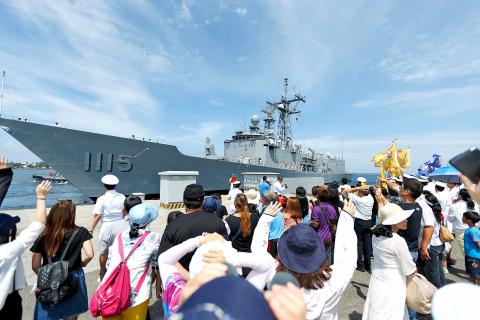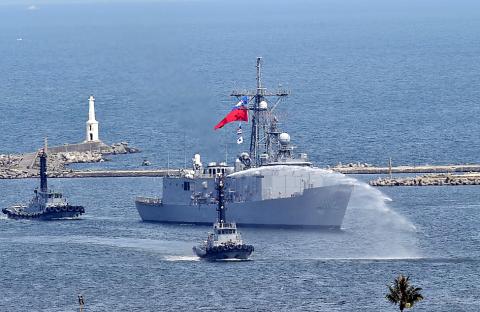Two Perry-class guided-missile frigates purchased from the US arrived in Kaohsiung yesterday, an acquisition that the Republic of China (ROC) Navy said will increase its anti-submarine capability.
Flying ROC national flags, the vessels, crewed by Taiwanese, sailed into Zuoying Military Harbor in Kaohsiung at about 9:30am, where a welcoming ceremony was held by the military.
A commissioning ceremony is slated for July next year, according to military sources.

Photo: CNA
The ships — which were cheaper than Taiwanese-made Cheng Kung-class frigates, the design of which is based on Perry-class frigates — were built in the 1980s.
The navy renamed them Ming Chuan No. 1112 and Feng Chia No. 1115.
They are to join the navy’s 146th fleet based on the outlying island of Penghu, from where they are to patrol the Taiwan Strait, the sources said.

Photo: Chang Chung-yi, Taipei Times
Perry-class frigates have high mobility and are equipped with the SQQ-89 undersea warfare combat system and the SQR-19 sonar system, both of which the military said would beef up its anti-submarine capabilities.
Then-US president Barack Obama signed a bill into law in December 2014 that authorized the sale of four Perry-class frigates to Taiwan.
Taipei budgeted about NT$5.5 billion (US$182 million at today’s exchange rate) in 2014 to purchase two of the ships, which were formerly named the USS Taylor (EFG-50) and the USS Gary (EFG-51) of the US Navy.
Admiral Huang Shu-kuang (黃曙光), commander of the ROC Navy, and family members of the crew were at the port to welcome the ships as they docked.
An official who declined to be named said the navy had been working with its US counterpart since May last year to bring the ships to Taiwan, adding that the crew underwent 10 months of tests and training with the US military.
The frigates are to be fitted with new equipment, while officers will be trained with the new ships before they are added into the naval force, the official said.
“Maintaining security and unimpeded passage in the waters around Taiwan is the navy’s greatest responsibility. We hope we will continue to have support in making arms purchases to ensure we can undertake this responsibility,” the sources said.
The numbering of the frigates — 1112 and 1115 — follows a convention in which the last two numbers of a ship’s name cannot add up to four, nor can the last digit be a four, the official said.
Case of all the digits adding up to four are also not used.
Four in Chinese has a similar pronunciation to the Chinese word for “die” (si, 死).
“The idea is that we hope officers will not be distracted by what might be perceived as an ominous ship name,” the official said, adding that as the previous Cheng Kung-class vessel to be added to the fleet was No. 1110, and 1111 adds up to four, the new ships were numbered starting from 1112.

LONG FLIGHT: The jets would be flown by US pilots, with Taiwanese copilots in the two-seat F-16D variant to help familiarize them with the aircraft, the source said The US is expected to fly 10 Lockheed Martin F-16C/D Block 70/72 jets to Taiwan over the coming months to fulfill a long-awaited order of 66 aircraft, a defense official said yesterday. Word that the first batch of the jets would be delivered soon was welcome news to Taiwan, which has become concerned about delays in the delivery of US arms amid rising military tensions with China. Speaking on condition of anonymity, the official said the initial tranche of the nation’s F-16s are rolling off assembly lines in the US and would be flown under their own power to Taiwan by way

‘OF COURSE A COUNTRY’: The president outlined that Taiwan has all the necessary features of a nation, including citizens, land, government and sovereignty President William Lai (賴清德) discussed the meaning of “nation” during a speech in New Taipei City last night, emphasizing that Taiwan is a country as he condemned China’s misinterpretation of UN Resolution 2758. The speech was the first in a series of 10 that Lai is scheduled to give across Taiwan. It is the responsibility of Taiwanese citizens to stand united to defend their national sovereignty, democracy, liberty, way of life and the future of the next generation, Lai said. This is the most important legacy the people of this era could pass on to future generations, he said. Lai went on to discuss

MISSION: The Indo-Pacific region is ‘the priority theater,’ where the task of deterrence extends across the entire region, including Taiwan, the US Pacific Fleet commander said The US Navy’s “mission of deterrence” in the Indo-Pacific theater applies to Taiwan, Pacific Fleet Commander Admiral Stephen Koehler told the South China Sea Conference on Tuesday. The conference, organized by the Center for Strategic and International Studies (CSIS), is an international platform for senior officials and experts from countries with security interests in the region. “The Pacific Fleet’s mission is to deter aggression across the Western Pacific, together with our allies and partners, and to prevail in combat if necessary, Koehler said in the event’s keynote speech. “That mission of deterrence applies regionwide — including the South China Sea and Taiwan,” he

UNPRECEDENTED: In addition to the approved recall motions, cases such as Ma Wen-chun’s in Nantou are still under review, while others lack enough signatures The Central Election Commission (CEC) announced yesterday that a recall vote would take place on July 26, after it approved the first batch of recall motions targeting 24 Chinese Nationalist Party (KMT) lawmakers and Hsinchu Mayor Ann Kao (高虹安). Taiwan is in the midst of an unprecedented wave of mass recall campaigns, following a civil society push that echoed a call made by Democratic Progressive Party (DPP) caucus whip Ker Chien-ming (柯建銘) in January to initiate signature drives aimed at unseating KMT legislators. Under the Civil Servants Election and Recall Act (公職人員選舉罷免法), Taiwanese can initiate a recall of district-elected lawmakers by collecting